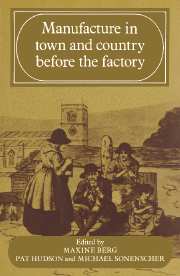Book contents
- Frontmatter
- Contents
- List of illustrations
- Acknowledgements
- 1 Manufacture in town and country before the factory
- 2 Political economy and the principles of manufacture 1700–1800
- PART I THE STRUCTURE OF MANUFACTURE
- PART II ‘WORK’ AND ‘WAGES’
- 6 Work and wages in Paris in the eighteenth century
- 7 Embezzlement, industry and the law in England, 1500–1800
- Appendix 1 Norwich embezzlement convictions in the eighteenth century: problems of evidence
- Appendix 2 Estimates of the size of the supplement to wages available through embezzlement in two eighteenth-century industries
- Appendix 3 Statutes concerned with embezzlement in the putting-out industries, 1500–1800
- Index
6 - Work and wages in Paris in the eighteenth century
Published online by Cambridge University Press: 16 October 2009
- Frontmatter
- Contents
- List of illustrations
- Acknowledgements
- 1 Manufacture in town and country before the factory
- 2 Political economy and the principles of manufacture 1700–1800
- PART I THE STRUCTURE OF MANUFACTURE
- PART II ‘WORK’ AND ‘WAGES’
- 6 Work and wages in Paris in the eighteenth century
- 7 Embezzlement, industry and the law in England, 1500–1800
- Appendix 1 Norwich embezzlement convictions in the eighteenth century: problems of evidence
- Appendix 2 Estimates of the size of the supplement to wages available through embezzlement in two eighteenth-century industries
- Appendix 3 Statutes concerned with embezzlement in the putting-out industries, 1500–1800
- Index
Summary
The terms ‘work’ and ‘wages’ seem to belong together. Like a number of other associated terms, they form a natural couplet, stretching back into the mists of time. Unlike work on the land or in the household, it has been usual to think of work in urban trades as work for wages. In many of the urban trades of the eighteenth century, however, the relationship between work and wages was mediated by a variety of non-monetary customs and rights. This fact is relatively well known, although its implications have still to be developed. This essay is an examination of the meaning of the wage in such a context, formed in this case by the often-disputed range of rights and customary arrangements which existed within the trades of eighteenth-century Paris. Its aim is to suggest a perspective upon the structure and internal mechanisms of artisanal production in which non-monetary forms of power are given their due weight.
It has been usual to think of the rights and customs of the world of workshop production of the eighteenth century within a framework of analysis informed either by notions of ‘the popular culture’ of the ‘pre-industrial world’ or by a perspective centred upon the idiom of corporate organisation and its attendant cultural and political implications. The objective here is to resituate custom and right within the organisation of the workshop itself. The present emphasis upon popular culture or the idiom of corporate organisation as explanatory principles of custom and right has occurred because it has been usual to assume that the workshop was merely a unit of production.
- Type
- Chapter
- Information
- Manufacture in Town and Country Before the Factory , pp. 147 - 172Publisher: Cambridge University PressPrint publication year: 1983
- 7
- Cited by



